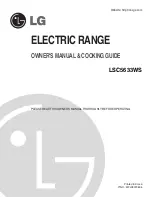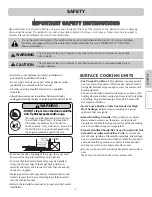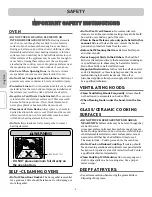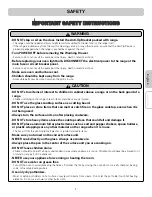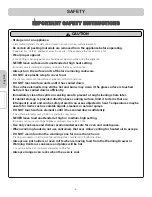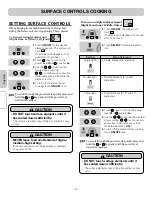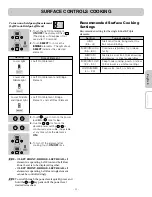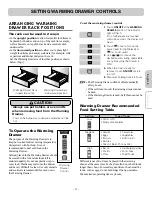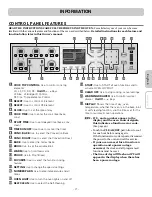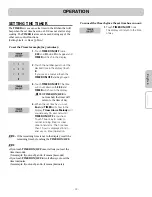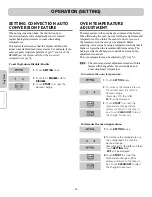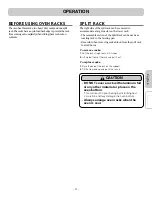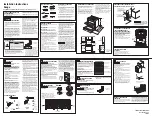
- 13 -
English
Français
COOKING AREAS
The cooking areas on your range are identified by permanent
circles on the glass cooktop surface. For the most efficient
cooking, fit the pan size to the element size.
Pans should not extend more than
1
/
2
to 1-inch
beyond the cooking area.
When a control is turned on, a glow can be seen through the
glass cooktop surface.
The element will cycle on and off
to maintain the preset heat setting, even on Hi.
For more information on cookware, refer to Cookware
Recommendations.
GLASS COOKTOP SURFACE NOTES:
•
Cooktop may emit light smoke and odor
the first few
times the cooktop is used. This is normal.
•
Glass cooktops retain heat for a period of time
after the elements are turned off.
Turn the elements
off a few minutes before food is completely cooked and use
the retained heat to complete cooking. When the hot
surface light turns off, the cooking area will cool down
enough to touch. Because of the way they retain heat, the
cooktop elements will not respond to changes in settings as
quickly as coil elements.
• In the event of a potential boilover, remove the pan from
the cooking surface.
•
Do not attempt to lift the cooktop.
• The smoothtop surface may appear discolored when it is
hot. This is normal and will disappear when the surface
cools.
G L A S S COOKTOP SURFACE
Bridge element
Triple element
Warming zone
Single element
TIPS TO PROTECT THE GLASS
COOKTOP SURFACE
Cleaning
(see pages 37~38 for more information)
Before first use, clean the cooktop.
Clean your cooktop daily or after each use. This will keep
your cooktop looking good and can prevent damage.
If a spillover occurs while cooking, immediately clean the
spill from the cooking area while it is hot to prevent a tough
cleaning chore later. Using extreme care, remove spill with a
proper metal scraper.
Do not
allow spills to remain on the cooking area or the
cooktop trim for a long period of time.
Do not
use abrasive cleansing powders or scouring pads
which will scratch the cooktop.
Do not
use chlorine bleach, ammonia, or other cleansers
not specifically recommended for use on glass-ceramic.
To Prevent Marks and Scratches
Do not use glass pans. They may scratch the surface.
Do not
place a trivet or wok ring between the surface and
pan. These items can mark or scratch the top.
Do not slide aluminum pans across a hot surface. The pans
may leave marks which need to be removed promptly.
(See Cleaning pages 37~38.)
Make sure the surface and the pan bottom are clean and dry
before turning on to prevent scratches.
To prevent scratching or damaging to the glass-ceramic top,
do not leave sugar, salt, or fats on the cooking area. Wipe the
cooktop surface with a clean cloth or paper towel before
using.
Do not
slide heavy metal pans across the surface since these
may scratch.
To Prevent Stains
Do not
use a soiled dish cloth or sponge to clean the
cooktop surface. A film will remain which may cause stains
on the cooking surface after the area is heated.
Continuously cooking on a soiled surface may/will result in a
permanent stain.
To Prevent Other Damages
Do not allow plastic, sugar, or foods with high sugar content
to melt onto the hot cooktop. Should this happen, clean
immediately. (See Cleaning pages 37~38.)
Do not
let a pan boil dry as this will damage the surface and
pan.
Do not
use cooktop as a work surface or cutting board.
Do not
cook food directly on the surface.
SURFACE CONTROLS COOKING
Summary of Contents for LSC5633WS
Page 45: ... 45 English Français MEMO ...
Page 46: ... 46 English Français MEMO ...

